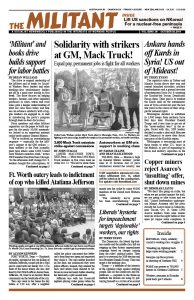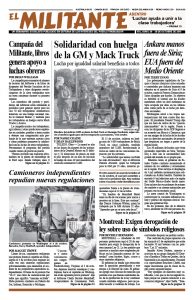After nearly two weeks of protest and a general strike by thousands of workers, students and indigenous peoples from the countryside, Ecuadorian President Lenín Moreno was forced to reverse his Oct. 1 decree that increased fuel prices in the country.
Moreno sent cops to use tear gas, rubber bullets and clubs and imposed a curfew, hoping to crush the protests. Seven people were killed, 1,340 injured and at least 1,152 detained. All to no avail. By Oct. 14 Moreno was forced to revoke the decree. Many of those jailed have since been released.
Indigenous peasant farmers and farmworkers had marched for miles to protest in the capital. They were joined by teachers, taxi drivers and other unionists and workers to oppose the increase. Other protests took place across the country.
Under the government’s decree, diesel fuel prices more than doubled from $1.03 to $2.30 a gallon, and gas jumped from $1.85 to $2.39. Public bus rides went up by a third.
This was a serious blow to workers and farmers in a country where more than 60% of the population lives on less than $11 a day. Ecuador has used the U.S. dollar as its currency since 2000.
For the last decade, Ecuador’s economy has been battered by the fall in oil prices, its main export.
Moreno imposed the anti-worker package at the behest of the U.S.-dominated International Monetary Fund as a condition for $4 billion in loans. Those loans are aimed at ensuring payment of the country’s foreign debt and improving conditions for capitalist investors. The package includes layoffs of workers at state-owned companies, cutting public workers annual vacations in half, to 15 days a year, and slashing temporary government workers’ wages by 20% if their contracts are renewed.
At the same time, the government reduced or eliminated tariffs on imported machinery, computers, cellphones and agricultural equipment.
U.S. capitalism is Ecuador’s largest trading partner, accounting for some $5.8 billion of the country’s imports and $6.7 billion of its exports.
A ‘progressive’ government
Moreno was the handpicked successor of former President Rafael Correa and had been Correa’s vice president when he was in office from 2007 to 2017. Correa’s government, like those of Hugo Chávez in neighboring Venezuela and Evo Morales in Bolivia, posed as a savior that would care for the poor and oppressed.
While calling themselves “socialists” or “revolutionary” — Correa called his government a “Citizens Revolution” — these governments strove to “manage” capitalism, not overthrow it. They rejected the example set by the Cuban Revolution of organizing and mobilizing workers and farmers. Instead they turned working people into recipients of welfare programs, while leaving industry, banks and landholdings in the hands of Ecuadorian capitalists and imperialist monopolies.
Hit by the 2008 global financial collapse, throughout his presidency Correa financed social programs and infrastructure by increasing debt as well as imposing some taxes and royalties on mining and oil concessions. This set the stage for today’s deeper crisis and the demands of the IMF.
Despite all his talk of governing for the poor, Correa clashed both with indigenous farmers and with workers in the cities. Indigenous leaders fought against his moves to open up their lands to capitalist mining companies.
After he took office, Moreno began to distance himself from much of Correa’s anti-imperialist rhetoric. He increasingly took steps toward accommodation with the U.S. rulers. He was quick to blame the government of Nicolás Maduro in Venezuela for the protests. Moreno has backed Washington’s efforts to overthrow Maduro.
On Oct. 7 Moreno appeared in a television address flanked by the army high command, charging the protests were a coup attempt orchestrated by former ally Correa, aided by Maduro.
Correa still enjoys support among many working people in Ecuador. But many workers and farmers among those fighting the government decree blamed both Correa and Moreno for the growing crisis. “Only the people can save the people,” the National Teachers Union said.
As the protests continued Moreno called for a dialogue, which was agreed to by the Confederation of Indigenous Nationalities of Ecuador (Conaie). Some 25% of Ecuador’s population is made up of various indigenous groups.
The government has now set up a commission, including leaders of Conaie, tasked with drawing up an alternative plan to lower the government’s budget deficit. Whether they can reach agreement remains to be seen.

